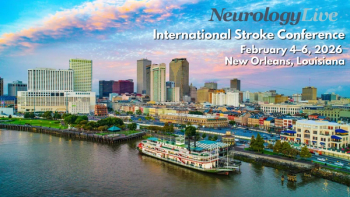
Impact of IV Glyburide after Hemispheric Stroke
The study is the first RCT to look at the impact of early treatment with IV glyburide on cerebral edema after large hemispheric stroke.
Intravenous (IV) glyburide given to reduce cerebral edema after large hemispheric stroke shows no significant difference from placebo in decreasing 90-day functional outcomes, according to results from the Glyburide Advantage in Malignant Edema and Stroke (GAMES-RP) study published online in LancetNeurology.
However, the study did find an association between IV glyburide and mortality, as well as some markers of brain edema.
“The GAMES-RP study did not identify any new safety concerns for intravenous glyburide beyond what is already known for oral glyburide. Although the primary and secondary efficacy outcomes were not significant, in participants with large hemispheric stroke who are at risk for cerebral oedema, intravenous glyburide might reduce mortality, midline shift, and concentrations of plasma MMP-9,” wrote first author Kevin Sheth, MD, of Yale University School of Medicine, and colleagues.
The study is the first randomized controlled trial to look at the impact of early treatment with IV glyburide on cerebral edema after large hemispheric stroke.
Cerebral edema may develop within 24-48 hours after a large hemispheric infarct. Up to 50% of patients who develop cerebral edema experience brain herniation and death. While decompressive craniectomy may decrease mortality and improve outcomes, surgery carries substantial morbidity and usually takes place only after a large amount of tissue injury has occurred. So far, no drug therapy has been evaluated to prevent cerebral edema.
Studies in rodents have suggested that blocking the sulfonylurea receptor 1 (SUR1)-transient receptor potential melastatin 4 (TROM4) channel in neurons, astrocytes, and endothelium may improve cerebral edema after stroke. Preclinical studies in humans have suggested that giving an IV infusion of the SUR1 inhibitor glyburide could improve survival and neurological recovery after stroke, according to background information in the article
The double-blind randomized, placebo-controlled phase 2 trial took place at 19 hospitals in the US between May 2013 and April 2015. It included 86 adult patients who had experienced a large anterior circulation hemispheric stroke with a baseline diffusion-weight MRI image lesion volume of 82-300 cm3. Researchers randomized patients to placebo (n=36) or IV glyburide (n=41) given within 10 hours of stroke onset. Glyburide was started as a 0.13 mg IV bolus for the first two minutes, followed by a 0.16 mg/h infusion for the first six hours, and then 0.11 mg/h infusion for the last 66 hours. The primary outcome was percent of patients without decompressive craniectomy who had a modified Rankin Scale (mRS) score of 0-4 at 90 days, a measure of functional outcome.
Key Results:
• Primary outcome: No significant difference between IV glyburide and placebo (41% (n=17) vs 39% (n=14), respectively; adjusted odds ratio 0.87, 95% (CI 0.32–2.32; P=0.77)
• Median midline shift at 72–96 h: Significantly less with IV glyburide vs placebo (4.6 mm vs 8.5 mm, respectively; P=0.0006)
• Matrix metalloproteinase 9 (MMP-9) at 24-72 hours: Significantly less with IV glyburide vs placebo (211.4 vs 345.8, respectively; P=0.006)
• All-cause mortality at 30 days: Significantly lower with IV glyburide (15% [n=6] vs 36% [n=13], respectively; P=0.03)
• All-cause mortality at 90 days: Nonsignificantly lower with IV glyburide (17% (n=7) vs 36% (n=13), respectively; P=0.06)
• Serious adverse events occurred in two patients in each group (P=1.00); one cardiac death occurred in each group
• Nine patients in the glyburide group experienced hypoglycemia (five mild, three moderate, and one severe); all episodes were treated according to protocol and resolved
Enrollment was ended early due to lack of funding, resulting in a small sample size that could have overestimated the effect of treatment. Also, the drug was started an average of 9 hours after stroke onset. That is comparatively late compared to preclinical studies and could have impacted treatment effect. Finally, more participants in the glyburide group received decompressive craniectomy than in the placebo group. However, sensitivity analyses showed similar risk of death between models adjusted and unadjusted for decompressive craniectomy.
The authors highlighted the 39% reduction in MMP-9 with IV glyburide, and explained that MMP-9 elevation is linked to severe stroke-related complications like cerebral edema. However, further study is needed to evaluate whether this reduction occurred because of brain effects or circulating inflammatory cells after stroke.
They concluded: “These findings identify a potential role of SUR1 in the pathogenesis of ischaemic brain swelling, and support further study of intravenous glyburide for this indication.”
Take-home Points
• Preclinical studies have suggested IV glyburide may improve survival and neurological recovery after stroke.
• The Glyburide Advantage in Malignant Edema and Stroke (GAMES-RP) found that giving IV glyburide within 10 hours of stroke onset resulted in no significant difference in 90-day functional outcomes vs placebo.
• Compared to placebo, IV glyburide resulted in significantly less midline shift, significantly lower MMP-9, significantly decreased all-cause 30-day mortality, and nonsignificantly decreased all-cause 90-day mortality.
• No new safety concerns were identified.
The study was funded by Remedy Pharmaceuticals.
Author Sven Jacobson is an employee, cofounder, and CEO of Remedy Pharmaceuticals. Author J Marc Simard has a patent related to the study and has shares in Remedy Pharmaceuticals. One or more of the other authors report grants, personal fees and/or nonfinancial support from Remedy Pharmaceuticals and/or the National Institute of Neurological Disorders and Stroke and National Institutes of Health.
Reference: Sheth KN, et al.
Newsletter
Keep your finger on the pulse of neurology—subscribe to NeurologyLive for expert interviews, new data, and breakthrough treatment updates.








